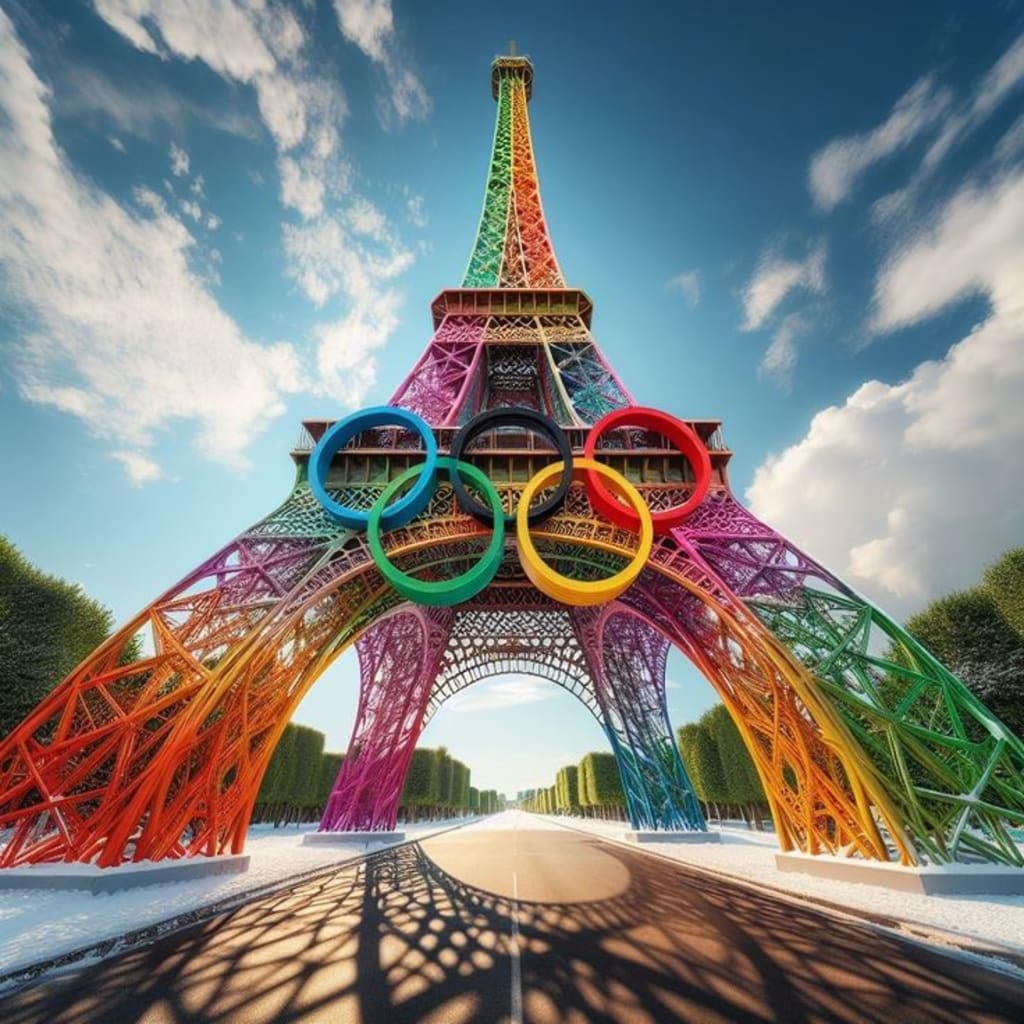Eiffel in Love with the Paris 2024 Olympics!
The ceremony you don't wanna miss!!

As the anticipation for the 2024 Summer Olympics continues to mount, there is a growing sense of excitement surrounding what is expected to be an extraordinary event. Taking place in the picturesque city of Paris, this international competition will showcase athletes from across the world in a setting known for its rich history, sophistication, and ardor. From July 26 to August 11, 2024, the City of Light is poised to evolve into the ultimate hub for sporting excellence, cultural festivities, and global harmony.
Paris is not solely serving as the host city for the Olympics; it is also leading a paradigm shift in our approach to large-scale events. The 2024 Summer Olympics are poised to be the most sustainable in history, reflecting a steadfast commitment to minimizing environmental impact and prioritizing eco-friendly practices. Through initiatives such as the repurposing of existing venues and the widespread incorporation of renewable energy, Paris 2024 is setting a pioneering example of the harmonious coexistence of sports and sustainability. Anticipate bearing witness to an unparalleled demonstration of environmentally conscientious and sustainable games.
The mascot designated for the Paris 2024 Summer Olympics is named Phryge. Drawing inspiration from the Phrygian cap, a symbol of freedom and revolution in France, Phryge embodies the spirit of the Games and the host country. This cap holds historical significance in French culture, often associated with liberty and the fight for freedom, making it a fitting emblem for the event. Phryge has been crafted to symbolize not just the sporting excellence of the Olympics, but also the cultural and revolutionary spirit that Paris contributes to the global stage. With its unique design and historical symbolism, Phryge aims to engage the imagination of people around the world and infuse a distinctive French essence into the 2024 Summer Olympics.
Here are the main venues for the Olympics 2024:
- Stade de France (Saint-Denis) - Athletics, Rugby Sevens
- Parc des Princes - Football
- Roland Garros - Tennis, Boxing
- Champ de Mars Arena - Judo, Wrestling
- Eiffel Tower Stadium - Beach Volleyball
- Palais de Tokyo - Skateboarding
- Grand Palais - Fencing, Taekwondo
- Les Invalides - Archery
- Paris La Défense Arena - Swimming, Water Polo
- Bercy Arena - Basketball, Gymnastics (artistic, rhythmic, trampoline)
- Le Bourget - Shooting
- Pont d’Iéna - Triathlon
- Porte de La Chapelle Arena - Badminton, Para Badminton
- Parc des Expositions - Weightlifting, Table Tennis, Boxing (preliminaries)
- Versailles - Equestrian, Modern Pentathlon
- Vaires-sur-Marne Nautical Stadium - Rowing, Canoeing
- Marseille - Sailing
- Lille - Handball (preliminaries)
- Nantes - Football
- Lyon - Football
- Nice - Football
- Bordeaux - Football
- Toulouse - Football
- Place de la Concorde - Urban Sports (3x3 Basketball, BMX Freestyle, Breaking)
- Champs-Élysées - Cycling (Road)
The Summer Games will, for the first time in history, not commence in a stadium but on the river Seine. Upon the unveiling of the concept in December 2021, Tony Estanguet, a three-time gold medalist and head of the Paris 2024 organizing committee, articulated the reimagined event: "The entire city has been reconfigured into an expansive Olympic stadium. The Seine serves as the track, and the quays symbolize the spectators' stands."
The ceremony is set to commence at 7:30 p.m. in Paris (1:30 p.m. ET) on July 26 and is projected to exceed three hours in duration. Enhanced by the natural light of the setting sun, the event is poised to emanate an even more profound sense of grandeur, offering a truly poetic experience that encourages both athletes and the public to appreciate the natural beauty of the City of Light. Nearly 100 boats will form a procession along a 6-kilometer (approximately 3.7 miles) stretch of the Seine, navigating from east to west through Paris, passing by iconic bridges, landmarks such as Notre-Dame and the Louvre, and Olympic venues, including the Grand Palais.
The focal participants in the upcoming event are the athletes, a total of 10,500 individuals who will represent 206 different National Olympic Committees. Theater actor and director Thomas Jolly has been appointed as the artistic director of the ceremonies, with a dedicated focus on showcasing the diverse cultures of France. Although specific details of the performances have been largely confidential, it is known that 3,000 artists will participate in both the opening and closing ceremonies of the Olympics and Paralympics. This will include 400 dancers under the direction of esteemed choreographer Maud Le Pladec, who expressed during rehearsals in June that "There won't be a single bridge in Paris without some dancers on it."
About the Creator
Sriparna Mallick
Looking to leverage my engineering expertise and strong writing skills to create impactful content in the writing industry. I'm here with the sports, fashion, life advice and other entertainment stuffs.
Enjoyed the story? Support the Creator.
Subscribe for free to receive all their stories in your feed.






Comments
There are no comments for this story
Be the first to respond and start the conversation.